六年级上册复习资料【英语】
六年级上册英语必背知识点

六年级上册英语必背知识点
以下是六年级上册英语的一些必背知识点:
1. 词汇:掌握六年级上册课本中的所有词汇,包括名词、动词、形容词等各类实词和虚词。
2. 语法:掌握简单句的基本结构,理解并运用一般现在时、一般过去时、一般将来时等时态。
3. 日常用语:掌握课本中出现的日常用语,能够在实际生活中运用。
4. 阅读理解:提高阅读速度和理解能力,能够理解简单的英文文章。
5. 写作:能够根据要求写出简单的英文短文,注意语法和拼写错误。
6. 听力:提高英语听力水平,能够听懂简单的英语对话和短文。
7. 口语:能够流利地与他人进行英语对话,表达清晰、准确。
8. 文化知识:了解一些基本的英美文化知识,提高跨文化交际能力。
9. 学习方法:掌握有效的英语学习方法,如多听、多说、多读、多写等。
10. 学习态度:培养积极的学习态度,如勤奋、认真、细心等。
以上是六年级上册英语的一些必背知识点,希望对您有所帮助。
人教版新版小学六年级英语上册全册学习资料
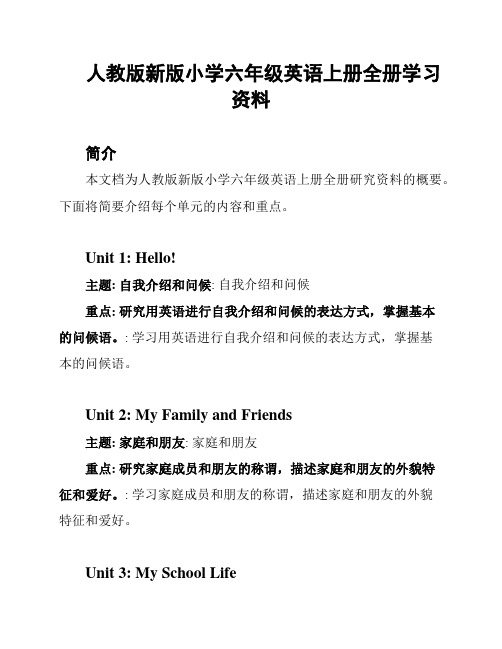
人教版新版小学六年级英语上册全册学习资料简介本文档为人教版新版小学六年级英语上册全册研究资料的概要。
下面将简要介绍每个单元的内容和重点。
Unit 1: Hello!主题: 自我介绍和问候: 自我介绍和问候重点: 研究用英语进行自我介绍和问候的表达方式,掌握基本的问候语。
: 学习用英语进行自我介绍和问候的表达方式,掌握基本的问候语。
Unit 2: My Family and Friends主题: 家庭和朋友: 家庭和朋友重点: 研究家庭成员和朋友的称谓,描述家庭和朋友的外貌特征和爱好。
: 学习家庭成员和朋友的称谓,描述家庭和朋友的外貌特征和爱好。
Unit 3: My School Life主题: 我的校园生活: 我的校园生活重点: 研究描述学校、教室、课程和活动的词汇,了解在校生活中的常见场景。
: 学习描述学校、教室、课程和活动的词汇,了解在校生活中的常见场景。
Unit 4: Leisure Time主题: 休闲时间: 休闲时间重点: 研究谈论休闲活动和爱好,了解并运用动词的ing形式。
: 学习谈论休闲活动和爱好,了解并运用动词的ing形式。
Unit 5: Let's Celebrate!主题: 节日庆祝: 节日庆祝重点: 研究讨论各种节日和庆祝活动,掌握相应的表达方式和词汇。
: 学习讨论各种节日和庆祝活动,掌握相应的表达方式和词汇。
Unit 6: Nature and Environment主题: 自然和环境: 自然和环境重点: 研究描述动物、植物和环境的词汇,了解一些自然保护的知识。
: 学习描述动物、植物和环境的词汇,了解一些自然保护的知识。
总结本册教材包含了六个单元的研究内容,涵盖了日常生活中常见的话题。
通过研究这些内容,学生将能够掌握基本的英语交流能力,并丰富自己的词汇量。
希望本册教材能对学生的英语研究有所帮助。
以上是《人教版新版小学六年级英语上册全册学习资料》的简要介绍。
如需详细内容,请参阅教材。
六年级上册英语复习资料
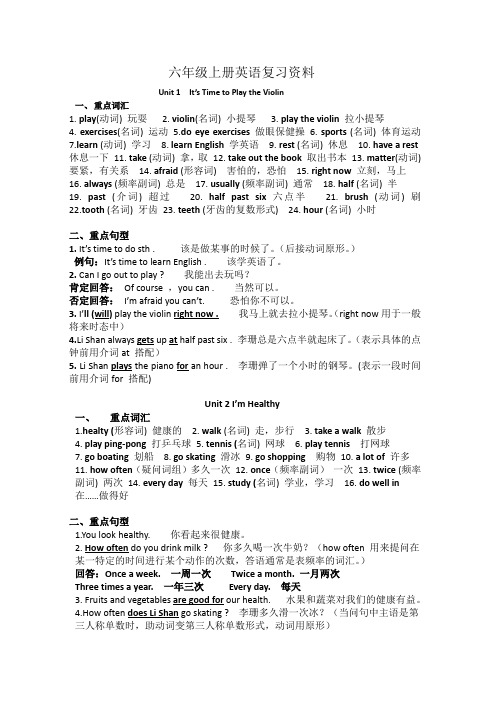
六年级上册英语复习资料Unit 1 It’s Time to Play the Violin一、重点词汇1.play(动词) 玩耍2. violin(名词)小提琴3. play the violin拉小提琴4. exercises(名词) 运动5.do eye exercises 做眼保健操6. sports (名词) 体育运动7.learn (动词) 学习8.learn English学英语9. rest (名词) 休息10. have a rest休息一下11. take (动词) 拿,取12. take out the book取出书本13. matter(动词)要紧,有关系14. afraid (形容词) 害怕的,恐怕15. right now 立刻,马上16. always (频率副词) 总是17. usually (频率副词) 通常18. half (名词) 半19. past (介词) 超过20. half past six六点半21. brush (动词) 刷22.tooth (名词) 牙齿23.teeth (牙齿的复数形式) 24.hour (名词) 小时二、重点句型1. It’s time to do sth .该是做某事的时候了。
(后接动词原形。
)例句:It’s time to learn English .该学英语了。
2. Can I go out to play ?我能出去玩吗?肯定回答:Of course ,you can . 当然可以。
否定回答:I’m afraid you can’t. 恐怕你不可以。
3. I’ll (will) play the violin right now .我马上就去拉小提琴。
(right now用于一般将来时态中)4.Li Shan always gets up at half past six .李珊总是六点半就起床了。
(表示具体的点钟前用介词at 搭配)5. Li Shan plays the piano for an hour .李珊弹了一个小时的钢琴。
新小学英语六年级上册复习资料
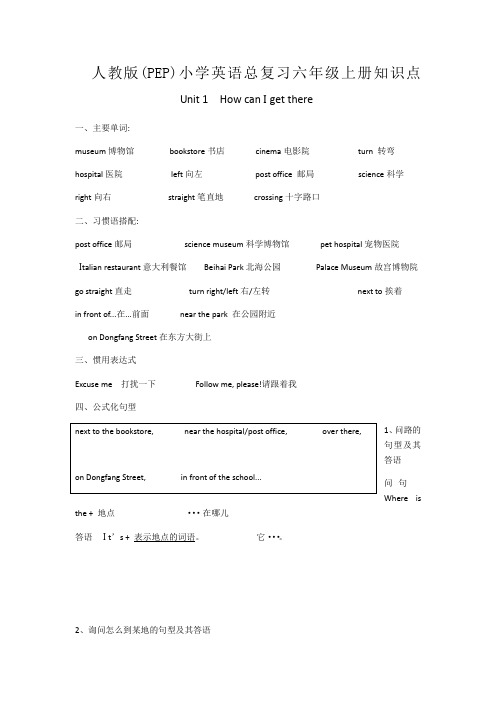
人教版(PEP)小学英语总复习六年级上册知识点Unit 1 How can I get there一、主要单词:museum 博物馆 bookstore 书店 cinema 电影院 turn 转弯hospital 医院 left 向左 post office 邮局 science 科学right 向右 straight 笔直地 crossing 十字路口二、习惯语搭配:post office 邮局 science museum 科学博物馆 pet hospital 宠物医院I talian restaurant 意大利餐馆 Beihai Park 北海公园 Palace Museum 故宫博物院go straight 直走 turn right/left 右/左转 next to 挨着 in front of...在...前面 near the park 在公园附近on Dongfang Street 在东方大街上 三、惯用表达式Excuse me 打扰一下 Follow me, please!请跟着我 四、公式化句型1、问路的句型及其答语 问句Where isthe + 地点 ···在哪儿 答语I t ’s + 表示地点的词语。
它···。
2、询问怎么到某地的句型及其答语 next to the bookstore, near the hospital/post office, over there,on Dongfang Street, in front of the school...问句How can +主语+ get (to)+the +地点···怎么到···同义句型Can you tell me the way to +地点Where is + 地点Which is the way to +地点答语Turn +方向+表示地点的介词短语。
六年级英语上册重点知识归纳

六年级英语重点知识归纳六年级英语上册重点知识归纳一、一般现在时1.概念:表示经常性、习惯性的动作,常与always等连用。
2. 用法:(1)常见的动词:go,come,leave,play,do,watch,see,read,study,write等。
(2)动词的第三人称单数:以o,e,s,x,ch,sh结尾的动词加es,辅音字母加y的动词,把y去掉。
如:goes,ives,buys,plays,watchs, sees, reads,writhes。
(3)句型:肯定句:主语+动词原形+其他主语+be+其他否定句:主语+don’t+动词原形+其他主语+be+not+其他一般疑问句:Do+主语+动词原形+其他?特殊疑问句:疑问词+do+主语+动词原形+其他?二、现在进行时1.概念:表示正在发生的动作。
2.用法:(1)常见的动词:be,run,walk,dance,eat,write,watch,see,read等。
(2)结构:主语+be+动词的ing+其他肯定句:主语+be+动词的ing+其他否定句:主语+don’t+动词原形+其他一般疑问句:Be+主语+动词原形+其他?特殊疑问句:疑问词+be+主语+动词原形+其他?三、一般过去时1.概念:表示过去发生的动作或存在的状态。
2.用法:(1)常见的动词:go,come,leave,play,do,watch,see,read,study,write等。
(2)动词的过去式:以ow,ay,io结尾的动词加ed,如:grew, cleaned,adopted。
其他结尾的动词减去词尾的e再加上ed,如:went-went-went,offered-offered-offered。
(3)句型:肯定句:主语+动词过去式+其他主语+was/were+其他否定句:主语+don’t/didn’t+动词原形+其他主语+was/were+not+其他一般疑问句:Did+主语+动词原形+其他?特殊疑问句:疑问词+did+主语+动词原形+其他?四、现在完成时1.概念:表示过去发生的动作对现在造成的影响或结果。
(完整word版)重大版小学英语六年级(上)复习资料

重大版小学英语六年级(上)复习资料一、重点单词参见重大版小学英语六年级(上)P65-67词汇表,词语分为黑体、有星号以及其他这三大类,请按照上面附注要求进行复习。
二、重点句型A:when is your birthday? 你的生日是什么时候?B: It’s in October. 在十月。
A: What’s the date today? 今天是几月几日?B:January 1st 一月一日。
A:Where is the libruary? 图书馆在哪里?B: It’s on the second floor. 在二楼。
A:How large and bright! 好大好明亮!A: Where are you going? 你要去哪里?B: I’m going to the art room. 我要去美术室。
A:Really? May I go with you? 真的吗?我能够和你一起去吗?B:Sure. 当然可以。
A:How do you go to the museum? 你怎么去博物馆?B:By bus. 乘公共汽车。
A:How does your sistre go to school? 你姐姐怎么去上学的?B;Sometimes by taxi, sometimeson foot. 又是坐出租车,有时走路。
A: Let’s take a walk. 我们去散步吧。
B:OK. Let’s go. 好,我们去吧。
A:What does this sign mean? 这个标志是什么意思?B: Don’t pick flowers.不要摘花。
A: It’s good to plant trees. 植树有益。
B: It’s bad to cut trees. 砍树有害。
A:We must n’t fight with each other. 我们不能打架。
B:We should love each other. 我们应当相互关爱。
六年级上册英语复资料

六年级上册英语复资料以下是六年级上册英语复习资料,包括一些重点词汇、短语和句子,以及一些常见的语法知识点。
重点词汇:1. subject 科目2. math 数学3. science 科学4. social studies 社会研究5. English 英语6. Chinese 语文7. music 音乐8. art 美术9. physical education 体育10. library 图书馆常见短语:1. have a good day 过得愉快2. see you later 待会儿见3. have a good time 过得开心4. let me know 让我知道5. have a look 看一看6. have a seat 请坐7. what about you 你呢8. I don’t know 我不知道9. I think so 我认为如此10. I’m not sure 我不能确定常见句子:1. What’s your favorite subject? 你最喜欢的科目是什么?2. I like math because it’s fun. 我喜欢数学因为它很有趣。
3. Do you like science? 你喜欢科学吗?4. Yes, I do. 是的,我喜欢。
5. No, I don’t. 不,我不喜欢。
6. What’s your favorite sport? 你最喜欢的运动是什么?7. My favorite sport is basketball. 我最喜欢的运动是篮球。
8. When do you usually get up? 你通常什么时候起床?9. I usually g et up at 7 o’clock. 我通常在7点钟起床。
10. How many hours do you sleep every night? 你每晚睡多少小时?语法知识点:1. 现在进行时:表示正在进行的动作或状态,结构为“be动词+动词ing”。
六年级英语上册复习资料(复习重点、习题、答案)
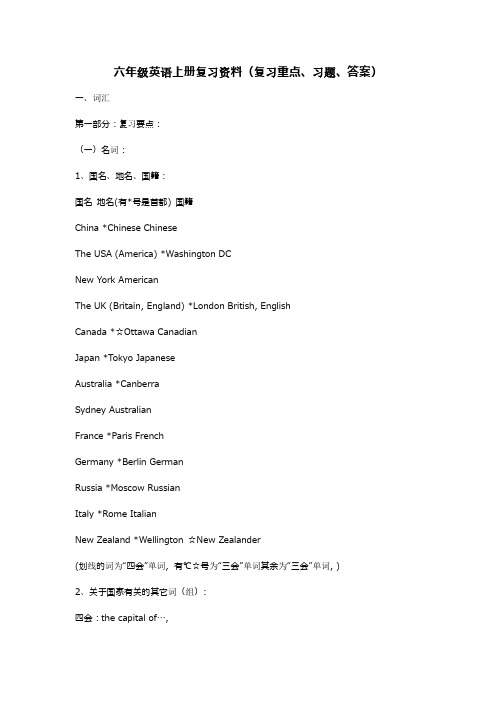
六年级英语上册复习资料(复习重点、习题、答案)一、词汇第一部分:复习要点:(一)名词:1、国名、地名、国籍:国名地名(有*号是首都) 国籍China *Chinese ChineseThe USA (America) *Washington DCNew York AmericanThe UK (Britain, England) *London British, EnglishCanada *☆Ottawa CanadianJapan *Tokyo JapaneseAustralia *CanberraSydney AustralianFrance *Paris FrenchGermany *Berlin GermanRussia *Moscow RussianItaly *Rome ItalianNew Zealand *Wellington ☆New Zealander(划线的词为“四会”单词,有℃☆号为“三会”单词其余为“三会”单词, )2、关于国家有关的其它词(组):四会:the capital of…,三会:th e population of…, national flag3、节日四会:festival, Spring Festival, Christmas,三会:Mid-autumn Festival, Dragon Boat Festival, Halloween, Easter4、食品:四会:dumpling三会:mooncake, zongzi, dimsun,5、饭餐:四会:meal, breakfast, lunch, dinner6、自然界四会:river, mountain, hill, lake7、其它:四会:clothes, problem, CD, VCD, doll, bookstore, history, question, turn, 三会:pearl, temple, adult, stocking, voice(二)代词:any no everything anything nothing everythingbody anybody nobody everybodyone anyone no one everyone(三)形容词(组):1、国家的,…民族的:四会:China, Chinese, American, British, English, Canadian三会:French, German, Japanese, Italian, Australian2、其它:四会:dirty, excellent, noisy, quiet, bored, boring, poor, free, busy, less, same, lucky, same, different, a lot of, lots of三会:crowded, stupid, afraid, western, popular,(四)数词:四会:hundred, thousand三会:million(五)动词(组):四会:have been to, go fishing/boating/swimming/shopping, love (our country), come to tea, invite (me, our teacher), ask for, bring (me the book), answerthe question, hear (me, the teacher), fell (happy), have a meal, be different from, finish (the exercise, one’s homework), phone (me, him), wait for (me, them), sounds (good, beautiful), go away, hope, see you later,三会:go on the Pearl River Cruise, take a message, dial, have a picnic, go outside, have a problem, mark the homework, decorate (the house, the Christmas tree), row the boat(六)表示时间的词或短语:四会:today, tonight, the day after tomorrow, the day before yesterday, in the morning (afternoon, evening), at night, for (an hour), during (the festival, holiday),第二部分:练习1. Write the right verb form after the model. 仿照例子,写出动词的形式。
2023年小学六年级英语上册总复习资料

2023年小学六年级英语上册总复习资料一、听力练
- 学生可以通过听录音来提高听力技能。
- 可以使用英语歌曲和儿童故事CD来训练听力。
- 在听力练中,强化对标准发音和语速的理解。
二、口语练
- 学生可以通过与同学进行英语口语对话来提高口语表达能力。
- 参加英语角活动,积极参与英语对话练。
- 创造外语环境,多与家人和朋友进行英语交流。
三、阅读理解
- 学生可以通过大量阅读英语文章来提高阅读理解能力。
- 多阅读英语故事书、儿童杂志和英语新闻。
- 注意理解关键词,提炼文章主旨。
四、写作训练
- 学生可以通过写作来提升英语写作能力。
- 练写日记、写信、写作文等。
- 注意语法、拼写和表达的准确性。
五、语法规则
- 学生需要掌握基本的英语语法规则。
- 研究动词的时态、主谓一致、名词单复数等。
- 参考英语语法书籍进行研究和巩固。
六、单词记忆
- 学生需要积累和记忆大量的英语单词。
- 利用单词卡片、应用程序等进行记忆。
- 多进行单词拼写和词汇运用的练。
以上是2023年小学六年级英语上册总复习的一些资料和建议,希望对学生们复习英语有所帮助。
祝大家学业进步!。
(精心归纳总结)六年级英语上册重点知识
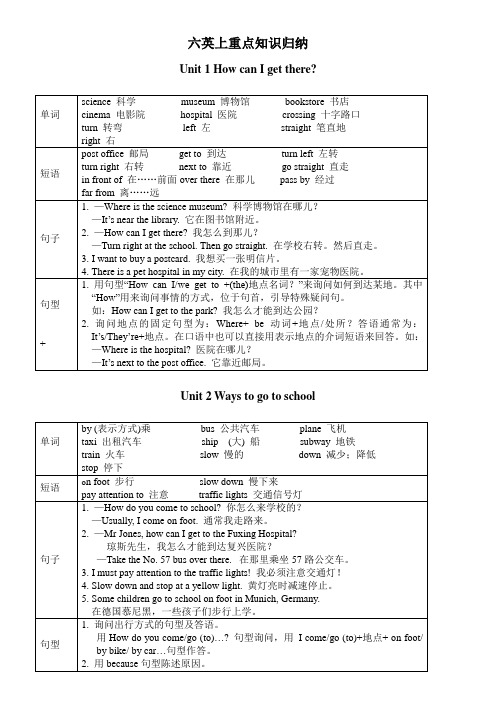
他喜欢猜字谜和远足吗?
—Yes, he does.是的,他喜欢。
句型
1.询问爱好的句型
固定句型:What is/are +one’s+ hobby/hobbies? (……有什么爱好?)
答语:人+like(s) doing…(……喜欢做……)
—She is a nurse.她是一名护士。
2.用句型“Where does+主语(第三人称单数)+work?”询问某人的工作地点。用句型“主语(第三人称单数)+works +(表示地点的)介词短语。”回答。如:
—Where does your father work?你爸爸在哪儿工作?
—He works in a car factory.他在一家汽车工厂工作。
wash clothes洗衣服draw pictures画画
make a snowman堆雪人go for a picnic去野餐
句子
1.—What are you going to do tomorrow?你明天打算做什么?
—I’m going to have an art lesson.我要上美术课。
5. Some children go to school on foot in Munich, Germany.
在德国慕尼黑,一些孩子们步行上学。
句型
1.询问出行方式的句型及答语。
用How do you come/go (to)…?句型询问,用I come/go (to)+地点+ on foot/ by bike/ by car…句型作答。
(完整版)人教版(PEP)小学英语六年级上册复习资料
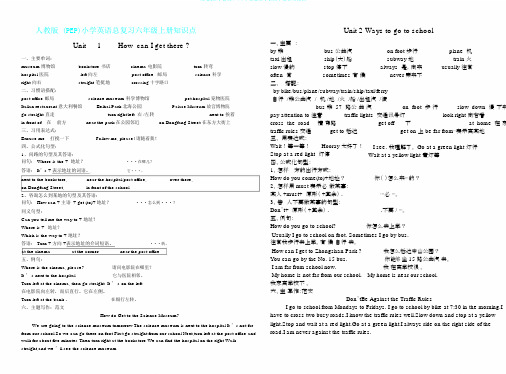
人教版 (PEP)小学英语总复习六年级上册知识点Unit1How can I get there ?一、主要单词:museum 博物馆bookstore 书店cinema 电影院turn 转弯hospital 医院left 向左post office邮局science 科学right 向右straight 笔挺地crossing 十字路口二、习惯语搭配:post office 邮局science museum 科学博物馆pet hospital 宠物医院Italian restaurant 意大利餐馆Beihai Park 北海公园Palace Museum 故宫博物院go straight 直走turn right/left 右 /左转next to 挨着in front of... 在 ...前方near the park 在公园邻近on Dongfang Street 在东方大街上三、习用表达式:Unit 2 Ways to go to school一、主要:by 乘bus 公共汽on foot 步行plane 机taxi 出租ship(大)船subway 地train 火slow 慢的stop 停下always 是,向来usually 往常often 常sometimes 有候never 素来不二、搭配:by bike/bus/plane/subway/train/ship/taxi/ferry自行 /乘公共汽 / 机 /地 /火 /船 /出租汽 /渡bus 乘 57 路公共汽on foot 步行slow down 慢下来pay attention to 注意traffic lights 交通讯号灯look right 向右看cross the road横穿路get off下at home 在家traffic rules 交通get to 抵达get on 上be far from⋯表示离某地Excuse me打搅一下Follow me, please! 请随着我!四、公式化句型:1、问路的句型及其答语:问句: Where is the + 地址?···在哪儿?答语: It’s + 表示地址的词语。
英语六年级上册必考知识点
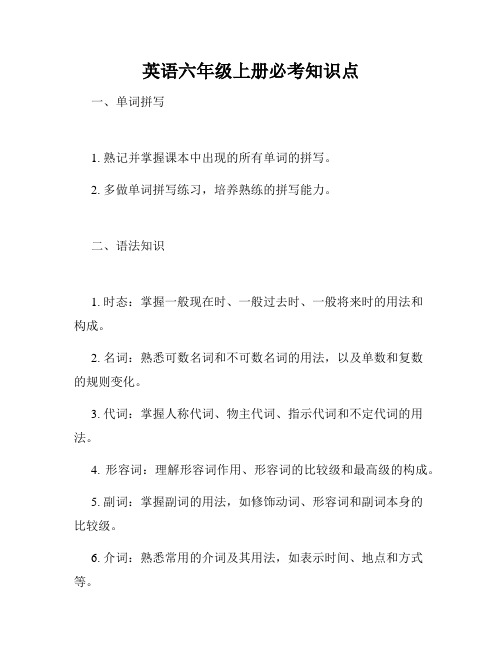
英语六年级上册必考知识点一、单词拼写1. 熟记并掌握课本中出现的所有单词的拼写。
2. 多做单词拼写练习,培养熟练的拼写能力。
二、语法知识1. 时态:掌握一般现在时、一般过去时、一般将来时的用法和构成。
2. 名词:熟悉可数名词和不可数名词的用法,以及单数和复数的规则变化。
3. 代词:掌握人称代词、物主代词、指示代词和不定代词的用法。
4. 形容词:理解形容词作用、形容词的比较级和最高级的构成。
5. 副词:掌握副词的用法,如修饰动词、形容词和副词本身的比较级。
6. 介词:熟悉常用的介词及其用法,如表示时间、地点和方式等。
7. 动词:了解动词的原形、过去式和过去分词的构成规则。
8. 人称代词和动词的一致性:掌握人称代词与动词之间的一致关系。
三、句型转换1. 肯定句转变为否定句和疑问句:掌握否定句和一般疑问句的构成规则。
2. 一般疑问句转变为肯定句和否定句:掌握回答一般疑问句的肯定和否定形式。
四、阅读理解1. 熟练阅读课本中的短文,并理解主旨内容。
2. 掌握从短文中获取关键信息的技巧,如寻找细节和推理等。
3. 培养阅读理解的速度和准确性,多做阅读练习。
五、写作能力1. 能够运用学到的基础词汇和语法知识,写出简单的句子和段落。
2. 培养表达思想的能力,逐渐提高写作的准确性和流畅性。
六、听力技巧1. 听力理解:提高听力的准确性和处理信息的能力。
2. 听写能力:提高听写的准确性和速度,注意拼写正确。
以上就是英语六年级上册必考的知识点汇总,希望同学们在备考过程中能够重点关注这些内容,加强基础,提高自身的英语水平。
祝大家取得好成绩!。
pep小学英语六年级上册复习资料

pep小学英语六年级上册复习资料PEP小学英语六年级上册复习资料随着小学六年级上册英语学习的逐渐结束,孩子们即将迎来期末考试。
为了帮助孩子们更好地复习,本文将提供一些PEP小学英语六年级上册的复习资料,希望能对孩子们的学习有所帮助。
一、基础词汇复习在六年级上册的学习中,孩子们已经掌握了一定的英语词汇量。
在复习过程中,可以通过词汇卡片的方式进行记忆。
将单词写在卡片上,一面写英文,一面写中文,然后将卡片翻过来,通过读英文来回忆中文的意思。
可以通过这种方式来巩固词汇。
二、语法知识复习除了词汇外,语法知识也是英语学习中非常重要的一部分。
在复习过程中,可以通过做一些语法练习来加深对语法知识的理解。
例如,练习使用动词的不同时态,练习使用不同的句型结构等等。
通过这些练习,可以帮助孩子们更好地掌握语法知识。
三、听力训练在六年级上册的学习中,听力训练是非常重要的一环。
通过听力训练,可以提高孩子们的听力理解能力,帮助他们更好地理解英语的听力材料。
可以通过听录音并回答问题的方式来进行听力训练。
还可以通过听故事、听对话等方式来提高听力技巧。
四、口语练习口语练习是英语学习中非常关键的一环。
通过口语练习,可以提高孩子们的口语表达能力,培养他们的英语口语思维。
可以通过角色扮演、对话练习等方式来进行口语练习。
还可以通过与同学或老师进行英语对话来提高口语水平。
五、阅读理解阅读理解是英语学习中非常重要的一项技能。
通过阅读理解练习,可以帮助孩子们提高阅读理解能力,培养他们的阅读习惯。
可以通过阅读短文并回答问题的方式来进行阅读理解练习。
还可以通过阅读故事、文章等来提高阅读理解能力。
六、写作训练写作是英语学习中培养孩子们语言表达能力的重要环节。
通过写作训练,可以提高孩子们的写作能力,培养他们的写作思维。
可以通过写日记、写作文等方式来进行写作训练。
还可以通过与同学或老师进行英语写作交流来提高写作水平。
以上是对PEP小学英语六年级上册的复习资料的介绍。
六年级英语上册重点单词句型语法复习资料
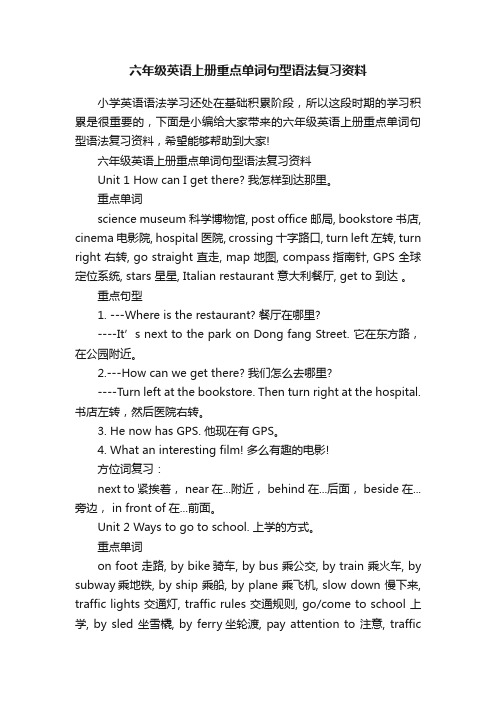
六年级英语上册重点单词句型语法复习资料小学英语语法学习还处在基础积累阶段,所以这段时期的学习积累是很重要的,下面是小编给大家带来的六年级英语上册重点单词句型语法复习资料,希望能够帮助到大家!六年级英语上册重点单词句型语法复习资料Unit 1 How can I get there? 我怎样到达那里。
重点单词science museum 科学博物馆, post office 邮局, bookstore书店, cinema电影院, hospital 医院, crossing 十字路口, turn left 左转, turn right 右转, go straight 直走, map 地图, compass指南针, GPS 全球定位系统, stars 星星, Italian restaurant 意大利餐厅, get to 到达。
重点句型1. ---Where is the restaurant? 餐厅在哪里?----It’s next to t he park on Dong fang Street. 它在东方路,在公园附近。
2.---How can we get there? 我们怎么去哪里?----Turn left at the bookstore. Then turn right at the hospital.书店左转,然后医院右转。
3. He now has GPS. 他现在有GPS。
4. What an interesting film! 多么有趣的电影!方位词复习:next to紧挨着, near在...附近, behind在...后面, beside在...旁边, in front of在...前面。
Unit 2 Ways to go to school. 上学的方式。
重点单词on foot 走路, by bike骑车, by bus 乘公交, by train 乘火车, by subway乘地铁, by ship 乘船, by plane 乘飞机, slow down 慢下来, traffic lights 交通灯, traffic rules 交通规则, go/come to school 上学, by sled 坐雪橇, by ferry坐轮渡, pay attention to 注意, trafficlights交通灯, Stop and wait at a red light 红灯停等一等, slow down and stop at a yellow light 黄灯减速并停下, Go at a green light 绿灯行。
六年级上册英语复习资料
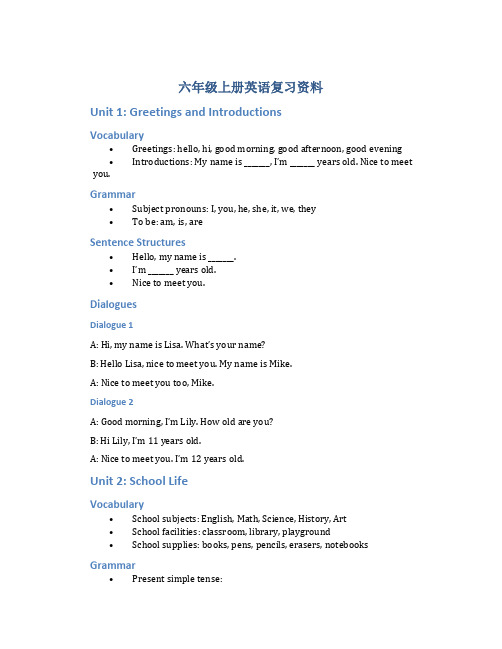
六年级上册英语复习资料Unit 1: Greetings and IntroductionsVocabulary•Greetings: hello, hi, good morning, good afternoon, good evening •Introductions: My name is _______, I’m _______ years old. Nice to meet you.Grammar•Subject pronouns: I, you, he, she, it, we, they•To be: am, is, areSentence Structures•Hello, my name is _______.•I’m _______ years old.•Nice to meet you.DialoguesDialogue 1A: Hi, my name is Lisa. What’s your name?B: Hello Lisa, nice to meet you. My name is Mike.A: Nice to meet you too, Mike.Dialogue 2A: Good morning, I’m Lily. How old are you?B: Hi Lily, I’m 11 years old.A: Nice to meet you. I’m 12 years old.Unit 2: School LifeVocabulary•School subjects: English, Math, Science, History, Art•School facilities: classroom, library, playground•School supplies: books, pens, pencils, erasers, notebooksGrammar•Present simple tense:–Positive: I/You/We/They + verb–Negative: I/You/We/They + don’t + verb–Question: Do + I/You/We/They + verb?Sentence Structures•I like _______.•I don’t like _______.•Do you like _______?DialoguesDialogue 1A: What subjects do you have at school?B: We have English, Math, Science, and History.A: That sounds interesting. Which one is your favorite?B: I like Math the most. What about you?A: I like Science.Dialogue 2A: Do you have any school supplies?B: Yes, I have books, pens, and notebooks.A: Do you like drawing?B: No, I don’t like drawing.Unit 3: Family and FriendsVocabulary•Family members: father, mother, brother, sister, grandparents •Friends: friend, best friend•Adjectives to describe people: kind, funny, smart Grammar•Possessive adjectives: my, your, his, her, our, their Sentence Structures•This is my _______.•He/She is my _______.DialoguesDialogue 1A: Who is the person in the picture?B: This is my mother.A: She looks very kind.B: Yes, she is very kind.Dialogue 2A: Who is your best friend?B: His name is Jack. He is very funny.A: That’s great.Unit 4: Daily ActivitiesVocabulary•Daily routine: wake up, get dressed, eat breakfast, go to school, have lunch, do homework, go to bed•Adverbs of frequency: always, often, sometimes, rarely, never Grammar•Present simple tense:–Positive: He/She/It + verb + s/es–Negative: He/She/It + doesn’t + verb–Question: Does + He/She/It + verb?Sentence Structures•I usually _______.•He/She always _______.•Does she _______?DialoguesDialogue 1A: What time do you usually wake up?B: I usually wake up at 7 o’clock.A: And when do you go to bed?B: I usual ly go to bed at 9 o’clock.Dialogue 2A: Does your brother do his homework every day?B: No, he rarely does his homework.A: Oh, that’s not good.Unit 5: Food and DrinksVocabulary•Food: bread, rice, noodles, chicken, beef, fish, vegetables, fruits •Drinks: water, milk, juice, tea, coffeeGrammar•Countable and uncountable nouns:–Countable: I have two _______.–Uncountable: I have some _______.Sentence Structures•I like eating _______.•I don’t like drinking _______.•Do you like eating _______?DialoguesDialogue 1A: What’s your favorite food?B: My favorite food is pizza.A: That sounds delicious.B: Yes, it’s very tasty.Dialogue 2A: Do you drink milk every day?B: No, I don’t like drinking milk.A: What do you drink then?B: I like drinking juice.ConclusionThis document serves as a review material for the content covered in the first semester of the sixth grade English course. It includes vocabulary, grammar, sentence structures, and dialogues from different units. By studying and practicing these materials, students will be able to reinforce their English language skills and prepare for future lessons.。
六年级上英语复习资料精简版
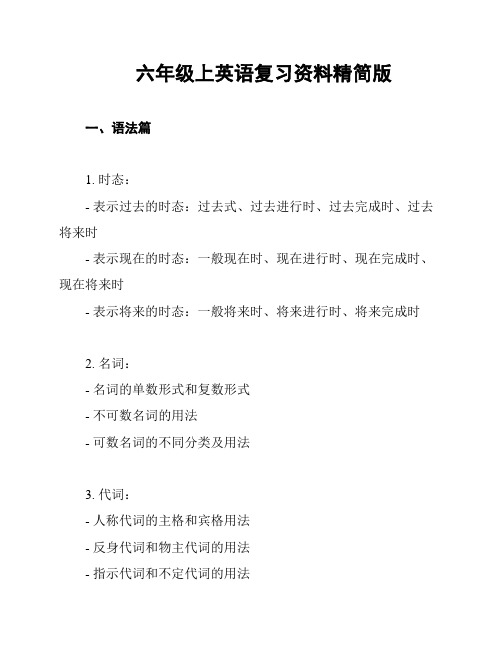
六年级上英语复习资料精简版一、语法篇1. 时态:- 表示过去的时态:过去式、过去进行时、过去完成时、过去将来时- 表示现在的时态:一般现在时、现在进行时、现在完成时、现在将来时- 表示将来的时态:一般将来时、将来进行时、将来完成时2. 名词:- 名词的单数形式和复数形式- 不可数名词的用法- 可数名词的不同分类及用法3. 代词:- 人称代词的主格和宾格用法- 反身代词和物主代词的用法- 指示代词和不定代词的用法4. 形容词:- 形容词的比较级和最高级形式- 形容词的修饰位置- 形容词的不规则变化5. 副词:- 副词的基本用法- 副词的比较级和最高级形式- 副词的位置和用法二、词汇篇1. 常用词汇:- 动物、颜色、食物等基本词汇- 家庭成员、学科、职业等常用词汇- 四季、天气、节日等词汇2. 动词短语:- 日常生活中常用的动词短语- 描述行为和活动的动词短语- 表示喜欢、能力等的动词短语三、对话篇1. 日常用语:- 问候和介绍的对话- 谢谢和道别的对话- 请求和应答的对话2. 生活场景:- 在家、学校、商店等场景的对话- 表达时间、日期、天气等场景的对话- 约会和旅行的对话3. 问题回答:- 图示答案的对话- 回答数字、颜色、时间等的对话- 回答个人信息的对话四、阅读篇1. 短文阅读:- 阅读短文并回答问题- 根据短文选择正确答案- 补全短文的题目2. 故事阅读:- 阅读故事并理解内容- 选择正确的主题词- 回答问题或完成句子五、写作篇1. 书面表达:- 描述人物的外貌和性格特点- 描述事件的发生过程- 发表自己的意见和观点2. 作文写作:- 写一封信给朋友或家人- 描述一次难忘的经历- 写一篇关于梦想的作文以上是六年级上英语的复习资料精简版,希望对你有帮助!。
- 1、下载文档前请自行甄别文档内容的完整性,平台不提供额外的编辑、内容补充、找答案等附加服务。
- 2、"仅部分预览"的文档,不可在线预览部分如存在完整性等问题,可反馈申请退款(可完整预览的文档不适用该条件!)。
- 3、如文档侵犯您的权益,请联系客服反馈,我们会尽快为您处理(人工客服工作时间:9:00-18:30)。
六年级上册复习资料一、词汇第一部分:复习要点:(一)名词:1、国名、地名、国籍:(划线的词为“四会”单词,有℃☆号为“三会”单词其余为“三会”单词, )2、关于国家有关的其它词(组):四会:the capital of…,三会:the population of…, national flag3、节日四会:festival, Spring Festival, Christmas,三会:Mid-autumn Festival, Dragon Boat Festival, Halloween, Easter4、食品:四会:dumpling三会:mooncake, zongzi, dimsun,5、饭餐:四会:meal, breakfast, lunch, dinner6、自然界四会:river, mountain, hill, lake7、其它:四会:clothes, problem, CD, VCD, doll, bookstore, history, question, turn,三会:pearl, temple, adult, stocking, voice (二)代词:(三)形容词(组):1、国家的,…民族的:四会:China, Chinese, American, British, English, Canadian三会:French, German, Japanese, Italian, Australian2、其它:四会:dirty, excellent, noisy, quiet, bored, boring, poor, free, busy, less, same, lucky, same,different, a lot of, lots of三会:crowded, stupid, afraid, western, popular, (四)数词:四会:hundred, thousand三会:million(五)动词(组):四会:have been to, go fishing/boating/swimming/shopping, love (ourcountry), come to tea, invite (me, our teacher),ask for, bring (me the book), answer the question, hear (me, the teacher), fell(happy), have a meal, be different from, finish(the exercise, one’s homework), phone (me, him),wait for (me, them), sounds (good, beautiful),go away, hope, see you later,三会:go on the Pearl River Cruise, take a message, dial, have a picnic, go outside, have a problem,mark the homework, decorate (the house, theChristmas tree), row the boat(六)表示时间的词或短语:四会:today, tonight, the day after tomorrow, the day before yesterday, in the morning (afternoon,evening), at night, for (an hour), during (thefestival, holiday),二、句型、语法第一部分:复习要点:1.你了解这些语法知识吗?你能运用在实际中运用这些语法知识吗?(1) 句子的构成可包括含to be, there be, to do的肯定式、否定式、一般疑问式。
To be:There be:To do (行为动词以work为例)(2) 读下面的特殊疑问式的句子,你能总结一些特殊疑问句的构成的规律吗?I.Who lives there.Who is singing in the room?Who was at home yesterday?II.What does he do?What is he doing?What did they do?When does he usually get up?When did she have dinner yesterday? Where is he now?Where are they planting trees?Where did they play football?How is your mother?How is he coming?How did they get there?Why does he go there?Why did she go there?III.Whose book is this?Whose parents are coming here?Which book is yours?Which presents did he give you?2. 关于形容词、副词的比较级和最高级(1) 你知道形容词、副词的比较级和最高级构成的一些规律吗?A. 一般情况下加-er, -est:long – longer, longest; small – smaller, smallestB. 重读闭音节,双写最后一个字母再加-er, -est:big –bigger, biggest; hot –hotter, hottestC. 辅音字母加y,改作后一个字母y为i再加-er, -est:funny –funnier, funniest, lucky –luckier, luckiestD. 部分双音节和多音节词,加more, most:slowly –more slowly, most slowly; more delicious, most deliciousE. 不规则变化:good – better, best; bad – worse, worst (2) 你知道形容词、副词的比较级和最高级句子的构成吗?A. This book is newer than that one.The English book is the newest of the three. Mike runs faster than John.Mike runs fastest in his class.B. This flower is more beautiful than that one. This tree is the oldest in the park.The girl is swimming better than the girl.Jim swims best in his group.C. Snakes are more dangerous than frogs.The meeting is the most important.The old man walks more slowly the young man. Kate jumps highest in her class.D. Tim has more books than Jim.Tim has the most stamps in his class.3. 关于代词some-, any-, no-, every-:(1) some- 多用在肯定句表示请求得到某些东西的句子:Someone will come here.Would you like something to eat.(2) any- 多用于疑问句或否定句:Is there anything in the box?We don’t want to see anyone of them?(3) no- 是事实的否定:There is nothing in the room.Nobody can do that.(4) 代词some-, any-, no-, every- 语法上看成是第三人称单数:There is something in the bottle.Everyone likes it.三、语篇第一部分:复习要点:1. 下面是本册要复习的日常生活用语,你知道它们的意思吗?(1) Shall we go shopping?Let go boating.OK / All right.(2) Would you like to go shopping with me?Yes, of course,Yes, I’d love to, but I am busy now.(3) Can you go with me?Of course.Sorry, I can’t.(4) Why don’t you go swimming?Great! That’s great!Good idea!(5) You’d better come here tomorrow.(6) To tell you the truth.(7) Good! / Great! / Excellent! / Fantastic!(8) What’s the matter?(9) Poor Ben!(10) Are you sure?Yes, I am sure.(11) Maybe we can have a party outside.(12) No problem!(12) May I speak to Jane?Speaking. / This is Jane speaking.(13) Who’s that, please?It’s Ben here.(14) See you then / later!See you! / Goodbye!(15) Is that 56778903?Wrong number.(16) Can you call back later?Can I take a message for him?No, thanks.(17) Don’t worry!(18) That sounds / looks interesting.(19) What day was it yesterday?It was Wednesday.(20) What was the date yesterday?It was December 30th.(21) Welcome to my home!Thank you.(22) I can’t wait.(23) He likes the food. Me too.四、听说第一部分:复习要点:1. 重点掌握计划、国家与城市、邀请、打电话、谈论过去、表示过去的日期、节日等的听说内容;2. 要提高自己的听说水平,首先要积极参与英语活动,应主动发言,积极回答问题;3. 在进行句子听写时,可以把听到老师说的句子在心中重复一次,努力理解句子的意思,在听第二遍时再写,当听第三遍后进行检查;4. 在听对话、短文时,注意先看题目,了解对话、短文可能提及的内容,当老师读对话、短文时,要注意关键词(如地点、时间、人物、动作等),如果某个地方听不懂,不要停留去想它。
